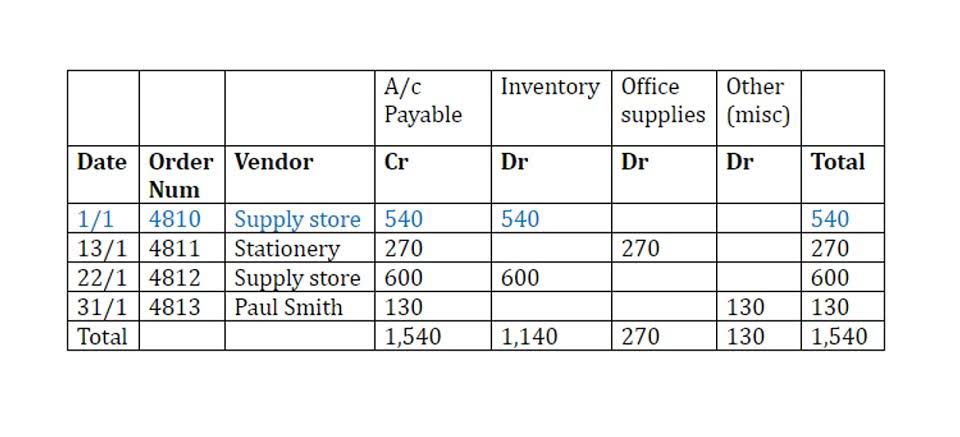There are many bookkeeping and accounting hidden secrets you need to know. Maintaining separate accounts also assists in tracking income and expenses related to the business, making tax preparation easier while minimizing potential legal issues. For example, if an LLC owner uses their personal account for business transactions, it can lead to confusion when trying to identify deductible business expenses during tax time. Before establishing a comprehensive accounting system, you’ll need to establish the tax treatment for LLC. You can choose to be taxed as a corporation, partnership, or sole proprietorship, and must make this election when you form the company.
- Online bookkeeping services present innovative ways of maintaining large volumes of financial records and even offer other services, such as an automated invoicing system.
- Set quarterly or monthly time on your calendar to review statements, run financial reports, reconcile accounts, and look for any inconsistencies.
- As a pass-through entity, an LLC’s profits and losses pass to the members’ personal tax returns.
- A qualified accountant can help LLCs to stay organized and compliant with LLC accounting requirements.
- This method is straightforward and suitable for smaller businesses that don’t have significant inventory or equipment involved in their finances.
- These platforms offer features like automated data entry, invoice generation, and financial report creation.
- Avoid co-mingling personal and business finances by setting up dedicated business bank accounts and credit cards.
Turn receipts into data for tax time ✨
Multi-member LLCs file a Form 1065 partnership return and each member receives a Schedule K-1. For multi-member LLCs, properly accounting for member profits and employee payroll is key. To meet the legal obligations of an LLC, it is important to have an efficient financial reporting process. However, that doesn’t mean you must hire a full-time bookkeeper or CFO to manage the complexities.
Tell me the best accounting method?
Considering factors such as liability helps ensure that personal assets remain protected from business liabilities. Moreover, establishing specific accounts such as revenue, expenses, assets, liabilities, equity, and owner’s equity is essential for organizing financial data effectively. Each type of account serves a distinct purpose in tracking the flow of money within the business. An LLC is treated as a pass-through entity accounting llc by default, which means profits and losses are reported on each member’s individual tax return. An LLC’s accounting practices are generally the same as other business entities with the exception of taxes. Companies will use this general ledger to keep track of any money that’s been received or tracked on a daily basis.
How can technology be leveraged for efficient LLC accounting?
True partners don’t count as employees for federal employment law purposes, which is why many accounting firms with large numbers of partners often prefer the LLP. Filing the articles of organization, often a brief document with little substantive information, creates the LLC. The meat of the deal is contained in the parties’ operating agreement, which is not filed and can even give nonmembers important roles. An LLC can own an interest in another LLC, and ultimate economic ownership of an LLC can become quite difficult for an outsider to determine (a common complaint). In those states, an LLC may create multiple “series” and, for example, conduct the LLC’s business through various series.
However, it can often be compared to a corporation in the sense that it has many of the same rights, without the same tax liabilities. That’s because LLC accounting is the backbone of all limited liabilities companies. LLC company owners need to focus on building strong accounting strategies that can back up their business finances from the get-go.
Setting up payroll can seem like a daunting task, QuickBooks but it doesn’t have to be. This will help identify any discrepancies and make sure that the books are in order. You can always hire an accountant, just check first how much do accountants charge. Suddenly, you realize that you’re no longer a one-person operation – you’re a business. And as a business, you need to start thinking about things like liability and taxes.
Step 1. Have separate business accounts
That said, the Uniform Law Commission has approved a revised version of the Uniform Partnership Act that would apply to partnerships the same rules as LLCs in this regard. Further, limited partnership law is yet a different universe, and it is common for limited partnership agreements to have agreements on fiduciary duties. Many states provide that a partner’s fiduciary duty of loyalty cannot be changed by agreement. There is often a limited ability to modify (but not eliminate) the fiduciary duty of loyalty under partnership law. On the other hand, many LLC statutes, including RULLCA, go further, permitting the fiduciary duty of loyalty to be eliminated “if not manifestly unreasonable” (RULLCA §110(d)).
- Factors like liability, flexibility, and operational structure play a significant role in this decision-making process.
- One of the best parts about an LLC is that the members in it have the right to agree how their distributions and allocations will be in order to meet the goals of their business.
- Typically, the member owns all or almost all of the interests in the LLC and has engaged in dubious conduct (see, e.g., Curci Investments LLC v. Baldwin, 221 Cal. Rptr. 3d 847 (Cal. Ct. App. 2017)).
- The accounting software is accessible on any device, but you need to set it up properly to enjoy its benefits.
- This is the practice of recording every transaction across two accounts to keep the books in balance.
We are experts in small business accounting and specialize in specific industries, gaining expertise in each field to ensure our work is accurate and done efficiently. A Schedule C is needed for filing taxes and reporting business income, and a Schedule SE is needed to pay self-employment taxes. Limited liability companies with a single owner or member get taxed by the IRS as sole proprietorships. In this way, personal and business finances will always remain separate. Separate business accounts are the first step https://www.bookstime.com/ toward sound financial reporting. Creditors of a member have little ability to get at the LLC’s business.





